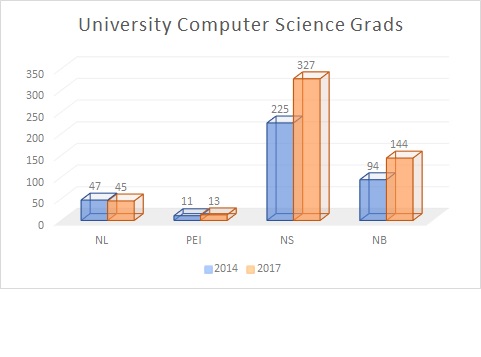Atlantic Canada’s post-secondary institutions graduated only about two-thirds of the IT personnel required by industry, says a new report from the Atlantic Provinces Economic Council, highlighting the tight labour market in IT.
The report Digital Technology Firms: Their Importance and Role in Atlantic Canada’s Economy, says there were 1,358 graduates from “digitally focussed” programs at Atlantic Canadian post-secondary institutions in 2017. That is well below the 2,000 workers required by industry each year.
The report, which was commissioned by the pan-regional IT group TechImpact, was published earlier this week and drew media attention because it noted the $6.1 billion in revenues produced by Atlantic Canadian companies engaging in IT. But one highlight of the report is it provides specific data on the tight labour market for tech personnel – an area of acute pain for the region’s IT companies.
“In Atlantic Canada there are . . . signs that pressures are intensifying,” says the report, whose lead author was Patrick Brannon, APEC’s Director of Major Projects. “The number of job vacancies for the computer and information professional industry in Atlantic Canada has increased from 195 people in Q4 2015 to 480 in Q4 2018.”
APEC estimates there were 43,000 people in Atlantic Canada’s digital industry labour force in 2016 – about two-thirds of them in industries outside the digital sector, such as large corporations that have substantial IT departments. The report said that IT companies themselves plan to hire 2,100 people over the next three years, and that average estimates say all employers in the region will be hiring about 2,000 IT professionals a year in the next few years.
The report highlights the acute pain IT companies are feeling in trying to hire tech talent. It surveyed companies on the problems they faced, and 52 percent of the IT companies responding identified recruiting and retaining skilled employees as a problem. That compared with 39 percent saying obtaining financing was a significant problem.
Read our Article on the Full APEC Report
The APEC report breaks down which companies are feeling the greatest pain in attracting tech talent. For example, companies with revenues of less than $500,000 rated the problem as 3.0 out of a possible five (with a score of five being severe pain). The larger the companies’ revenue, the more intense was their need for IT personnel, with companies whose sales were above $10 million rating it a 4.0.
In a provincial breakdown, the most severe pain was felt in New Brunswick (3.87) and Newfoundland and Labrador (3.67), whereas Nova Scotia registered a relatively benign 2.84.
Atlantic Canadian universities and colleges are producing more “digitally focused” graduates – up 19 percent to 1,358 in 2017 from 1,139 in 2015. But the numbers still fall short of demand, and there has been no real growth in the number of graduates in Newfoundland and Labrador and Prince Edward Island. (See the chart above.)
“Community colleges are increasing their focus on digital technology related programs,” says the report. “Graduates have increased from 388 in 2015 to 620 in 2018, with the fastest growth in New Brunswick.” It also says that post-secondary institutions find it difficult to increase capacity in a given program quickly due to tenured professors and the number of parties that must agree to curriculum changes.
Females comprise 23 percent of the digital industry labour force in Atlantic Canada and Canada, about half the rate for all industries – and a rate that did not improve between 2011 and 2016. Indigenous workers make up 1.5 percent of the digital industry’s workforce, though APEC admitted 10 percent of the respondents to its survey did not know whether they had native workers.










